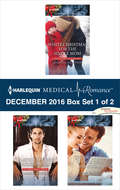- Table View
- List View
Harlequin Medical Romance December 2016 - Box Set 1 of 2: White Christmas for the Single Mom\Playboy on Her Christmas List\The Doctor's Sleigh Bell Proposal
by Carol Marinelli Susan Carlisle Susanne HamptonHarlequin® Medical Romance brings you a collection of three new titles, available now! Enjoy these stories packed with pulse-racing romance and heart-racing medical drama. This Harlequin Medical Romance box set includes: WHITE CHRISTMAS FOR THE SINGLE MOMChristmas Miracles in Maternity by Susanne Hampton Will single mom Juliet Turner's chemistry with Dr. Charlie Warren make this a Christmas to remember? PLAYBOY ON HER CHRISTMAS LISTThe London Primary Hospital by Carol MarinelliSnowed in with Holly Jacobs, playboy doc Daniel Chandler wonders if their connection is for life--not just for Christmas... THE DOCTOR'S SLEIGH BELL PROPOSAL by Susan CarlisleCould Ellen Cox's desire for her handsome boss, Chance Freeman, lead to a very special Christmas proposal? Join HarlequinMyRewards.com to earn FREE books and more. Earn points for all your Harlequin purchases from wherever you shop.
Harlequin Medical Romance December 2016 - Box Set 2 of 2: A Royal Baby for Christmas\The Army Doc's Baby Bombshell\Christmas with the Single Dad
by Sue Mackay Scarlet Wilson Louisa HeatonHarlequin® Medical Romance brings you a collection of three new titles, available now! Enjoy these stories packed with pulse-racing romance and heart-racing medical drama. This Harlequin Medical Romance box set includes: A ROYAL BABY FOR CHRISTMASChristmas Miracles in Maternity by Scarlet Wilson Prince Sebastian Falco is determined to make Sienna McDonald his bride--and claim his royal baby for Christmas! THE ARMY DOC'S BABY BOMBSHELL by Sue MacKayWhen Cooper Daniels discovers Sophie Ingram's baby secret, he vows to protect his new family...but can he offer his heart? CHRISTMAS WITH THE SINGLE DAD by Louisa HeatonSingle dad Nathan Jones longs to welcome Sydney Harper into his family--not just for Christmas, but forever! Join HarlequinMyRewards.com to earn FREE books and more. Earn points for all your Harlequin purchases from wherever you shop.
Harlequin Medical Romance December 2017 - Box Set 1 of 2: Christmas Bride for the Sheikh\Christmas with the Best Man\Navy Doc on Her Christmas List
by Carol Marinelli Susan Carlisle Amy RuttanHarlequin Medical Romance brings you a collection of three new titles, available now! Enjoy these stories packed with pulse-racing romance and heart-racing medical drama.This Harlequin Medical Romance box set includes:CHRISTMAS BRIDE FOR THE SHEIKHRuthless Royal Sheikhs—also in this linked duet Captive for the Sheikh’s Pleasure is available in December from Harlequin Presentsby Carol MarinelliHe enticed her into one sizzling night… Now notorious sheikh Hazin al-Razim is desperate to claim midwife Flo as his bride! CHRISTMAS WITH THE BEST MANChristmas in Manhattanby Susan CarlislePlayboy doc Elijah Davenport doesn’t believe in love, but will the passion he shares with Dr. Helena Tate change his mind? NAVY DOC ON HER CHRISTMAS LISTChristmas in Manhattanby Amy RuttanFormer navy doc Zac Davenport once broke her vulnerable heart, but being snowed in with him has Dr. Ella Lockwood thinking about one more irresistible kiss…Join HarlequinMyRewards.com to earn FREE books and more. Earn points for all your Harlequin purchases from wherever you shop.
Harlequin Medical Romance December 2017 - Box Set 2 of 2: The Nurse's Special Delivery\Her New Year Baby Surprise\Her Knight Under the Mistletoe
by Louisa George Annie O'Neil Sue MacKayHarlequin Medical Romance brings you a collection of three new titles, available now! Enjoy these stories packed with pulse-racing romance and heart-racing medical drama.This Harlequin Medical Romance box set includes:THE NURSE’S SPECIAL DELIVERYThe Ultimate Christmas Giftby Louisa GeorgeTheir attraction was instant! But how can nurse Abbie Cook tell gorgeous paramedic Callum Baird her best friend’s about to give birth to her surrogate baby? HER NEW YEAR BABY SURPRISEThe Ultimate Christmas Giftby Sue MacKayNurse Emma Hayes was happy being a surrogate for her best friend, and with her life, until Dr. Nixon Wright gets under her skin…with unexpected consequences. HER KNIGHT UNDER THE MISTLETOEby Annie O’NeilDr. Amanda Wakehurst hopes for a family this Christmas when ER doc Matthew Chase discovers her secret—their son!
Harlequin Medical Romance December 2018 - Box Set 1 of 2: The Army Doc's Christmas Angel\The Billionaire's Christmas Wish\Christmas with Her Bodyguard
by Tina Beckett Annie O'Neil Charlotte HawkesHarlequin Medical Romance brings you a collection of three new titles, available now! Enjoy these stories packed with pulse-racing romance and heart-racing medical drama.This Harlequin Medical Romance box set includes:THE ARMY DOC’S CHRISTMAS ANGELHope Children’s Hospitalby Annie O’NeilPediatrician Dr. Finn Morgan’s pushed everyone away since losing his leg in Afghanistan. Until he begins working with stunning Naomi…THE BILLIONAIRE’S CHRISTMAS WISHHope Children’s Hospitalby Tina BeckettWhile visiting diagnostician Madison Archer works to find a cure for his sick daughter, Theo Hawkwood’s fighting a growing attraction…to her!CHRISTMAS WITH HER BODYGUARDby Charlotte HawkesObstetrician Rae Rawlstone’s past is catching up with her—she’s spending Christmas under the protection of first love Major Myles Garrington!
Harlequin Medical Romance December 2018 - Box Set 2 of 2: Their Christmas to Remember\Healed Under the Mistletoe\ER Doc's Forever Gift
by Amalie Berlin Sue MacKayHarlequin Medical Romance brings you a collection of three new titles, available now! Enjoy these stories packed with pulse-racing romance and heart-racing medical drama.This Harlequin Medical Romance box set includes:THEIR CHRISTMAS TO REMEMBERScottish Docs in New Yorkby Amalie BerlinWorking together to bring the joy of Christmas to their young patients, surgeon Wolfe McKeag and doctor Angel’s chemistry becomes irresistible!HEALED UNDER THE MISTLETOEScottish Docs in New Yorkby Amalie BerlinCould nurse Belle Sabetta’s innocence and passion be the gift that heals the heartbreak of Dr. Lyons McKeag’s loss this Christmas?ER DOC’S FOREVER GIFTby Sue MacKayHer sexy new neighbor, Dr. Harry Frost, is oh-so-tempting… Could everything Sienna Burch wants for Christmas be right next door?
Harlequin Medical Romance December 2019 - Box Set 1 of 2
by Louisa George Annie O'Neil Karin BaineHarlequin Medical Romance brings you a collection of three new titles, available now! Enjoy these stories packed with pulse-racing romance and heart-racing medical drama.This Harlequin Medical Romance box set includes:MAKING CHRISTMAS SPECIAL AGAINPups that Make Miraclesby Annie O’NeilOffering lone-wolf A&E consultant Max the proceeds from her charity ball to keep his therapy unit is reopening vet Esme’s heart—to him! THEIR ONE-NIGHT CHRISTMAS GIFTPups that Make Miraclesby Karin BaineA recent chance reunion leads to one unforgettable night between neurologist Charles and his ex-fiancée, orthopedic surgeon Harriet…and one unexpected Christmas miracle!A PUPPY AND A CHRISTMAS PROPOSALby Louisa GeorgeWarmhearted vet Beth is about to come face-to-face with the last thing she wants this Christmas—her ex-fiancé, Alex, clutching an adorable puppy!
Harlequin Medical Romance December 2019 - Box Set 2 of 2
by Alison Roberts Kate Hardy Emily ForbesHarlequin Medical Romance brings you a collection of three new titles, available now! Enjoy these stories packed with pulse-racing romance and heart-racing medical drama.This Harlequin Medical Romance box set includes:SINGLE DAD IN HER STOCKINGby Alison RobertsThis Christmas, emergency locum Emma’s covering for A&E consultant Max…the playboy turned single dad she once shared an unforgettable kiss with.MISTLETOE PROPOSAL ON THE CHILDREN’S WARDby Kate HardyMaking a festive bargain with Muswell Hill Memorial’s new locum surgeon, Jamie, leads to a powerful connection that children’s doctor Anna never expected…TAMING HER HOLLYWOOD PLAYBOYby Emily ForbesWhen Hollywood actor Oliver’s playboy reputation threatens his hard-earned career, he turns to paramedic Kat—to pose as his fiancée!
Harlequin Medical Romance December 2020 - Box Set 1 of 2
by Louisa George Annie O'Neil Charlotte HawkesHarlequin Medical Romance brings you a collection of three new titles, available now! Enjoy these stories packed with pulse-racing romance and heart-racing medical drama.This Harlequin Medical Romance box set includes:THE BODYGUARD’S CHRISTMAS PROPOSALChristmas at Seattle GeneralBy Charlotte HawkesNurse Kat’s world is upended by the arrival of Dr Logan! Still, world-weary Logan’s not looking for Happily-Ever-After. Could Kat, and a sprinkle of mistletoe magic, change that?THE PRINCESS’S CHRISTMAS BABYChristmas at Seattle GeneralBy Louisa GeorgeWhen a weekend fling leads to an unexpected consequence, Dr Lucas and Princess Gigi’s lives are forever changed. Now, Gigi must choose: the crown, or the family she’s always wanted…CHRISTMAS UNDER THE NORTHERN LIGHTSBy Annie O’NeilBetrayed by her fiancé, Audrey escapes to remote Bourtree Island… But she can’t escape Cooper… the gorgeous doctor she must work with!
Harlequin Medical Romance December 2020 - Box Set 2 of 2
by Marion Lennox Kate Hardy Allie KincheloeHarlequin Medical Romance brings you a collection of three new titles, available now! Enjoy these stories packed with pulse-racing romance and heart-racing medical drama.This Harlequin Medical Romance box set includes:MISTLETOE KISS WITH THE HEART DOCTORBy Marion LennoxAfter rescuing cardiologist Marc from an underground cave, island GP Elsa finds herself accepting his offer of help in return. But, soon she’s fighting to protect her heart…FOREVER FAMILY FOR THE MIDWIFEBy Kate HardyEver since his ex abandoned him, Midwife Nathaniel has been wary of love. Until he meets obstetrician Rebecca, and sparks fly. Will they take a leap of faith — on each other?A NURSE, A SURGEON, A CHRISTMAS ENGAGEMENTBy Allie KincheloeLena has serious doubts about playboy surgeon Dex’s request that she be his plus-one… But he surprises her at every turn. Could Dex be the man she swore she never wanted?
Harlequin Medical Romance December 2022 - Box Set 2 of 2
by Scarlet Wilson Louisa George Amy RuttanHarlequin Medical Romance – December &‘22 – Box Set 2 of 2Harlequin Medical Romance brings you a collection of three new titles, available now! Enjoy these stories packed with pulse-racing romance and heart-racing medical drama. This Harlequin Medical Romance box set includes: SNOWED IN WITH THE SURGEONBy Scarlet WilsonWhen Dr Paige is suddenly thrown into a major incident and snowbound with sexy surgeon, Stefan, she can&’t deny their chemistry! But what will happen when the snow melts and they have to face the real world?RESISTING THE SINGLE DAD DOCRawhiti Island MedicsBy Louisa GeorgeFor widow Carly it&’s finally time to move on from the island she calls home. Until she meets new neighbor, GP Owen and his adorable son. She must resist their undeniable attraction – easier said than done after he kisses her under the stars…!PARAMEDIC&’S ONE-NIGHT BABY BOMBSHELLBy Amy RuttanDr Jo&’s uncharacteristic one-night stand with paramedic, Henrik, exceeds expectations! And so do the consequences… Jo never thought she&’d have children. And now she&’s wondering, what will happen when she tells no strings Henrik &‘I&’m pregnant. And the baby&’s yours&’?
Harlequin Medical Romance December 2023 - Box Set 1 of 2
by Traci Douglass Louisa George Deanne AndersHarlequin Medical Romance brings you a collection of three new titles, available now! Enjoy these stories packed with pulse-racing romance and heart-racing medical drama.This Harlequin Medical Romance box set includes:HOME ALONE WITH THE CHILDREN&’S DOCTORBoston Christmas Miracles By Traci DouglassBusy children&’s doc Kalista is looking forward to being home alone for the holidays. But, unexpectedly having her best friend&’s brother—and old flame!—pediatrician Dylan temporarily move in ruins her plans! Because, although Kali doesn&’t want &“forever&” any more than the playboy, she certainly wants him…A SURGEON&’S CHRISTMAS BABY Boston Christmas MiraclesBy Deanne AndersNotoriously grumpy children&’s surgeon Ben has until Christmas to become a team player. And the only person who&’ll help is cheerful Dr. Izzy Jeong—the woman he spent one mind-blowing night with! But when he learns she&’s carrying his baby, he must decide between his fear and his future…REUNITED BY THE NURSE&’S SECRETBy Louisa GeorgeNurse Mia&’s instant chemistry with paramedic Brin allowed them both a moment of freedom from their pain the night they met. But after they parted, Mia discovered she was pregnant! Three years later, she&’s unprepared for a shocking reunion with Brin. Could her life-changing secret offer a fresh start?
Harlequin Medical Romance December 2023 - Box Set 2 of 2
by Alison Roberts Marion Lennox Sue MacKayHarlequin Medical Romance brings you a collection of three new titles, available now! Enjoy these stories packed with pulse-racing romance and heart-racing medical drama.This Harlequin Medical Romance box set includes:HEALED BY A MISTLETOE KISSBy Alison RobertsTrauma surgeon Nikkita wasn&’t expecting her temporary replacement to be blast from the past, Pedro! Nikkita knows she&’s a shadow of the woman he knew, but she feels an overwhelming sense of security with Pedro. Will a mistletoe kiss be the gift she needs to make her whole again?BABY SHOCK FOR THE MILLIONAIRE DOCBy Marion LennoxDr. Angus lives life unattached. Until alluring Dr. Misty arrives with shocking news—her new baby niece…is his daughter! Angus must take responsibility. But protecting his heart is impossible after he and Misty share a passionate kiss! Can this millionaire doc lower his guard…to claim his unexpected family?RESISTING THE PREGNANT PEDIATRICIAN By Sue MacKayTo escape a recent trauma, famous ER doc Aaron takes up a residency in Italy. Meeting gorgeous pediatrician Bella was not on the agenda! But widowed Bella is pregnant, so Aaron&’s determined to place her firmly in the friend-zone. Until the night their desire becomes too intense to resist!
Harlequin Medical Romance December 2024 - Box Set 1 of 2
by Scarlet Wilson Traci Douglass Annie ClaydonHarlequin Medical Romance – December &‘24 – Box Set 1 of 2Harlequin Medical Romance brings you a collection of three new titles, available now! Enjoy these stories packed with pulse-racing romance and heart-racing medical drama.This Harlequin Medical Romance box set includes:MELTING DR. GRUMPY&’S FROZEN HEARTChristmas North and SouthBy Scarlet WilsonAfter his engagement to another doctor collapsed, oncologist Jay has had it with hospital relationships. But something about new colleague Dr. Skye and her Miss Sunshine personality intrigues him… Skye needs Jay to sign off on the groundbreaking cancer research that has been her solace since her own devastating loss. She can&’t resist tempting this grumpy doc out of his shell with some festive treats, but it&’s their chemistry that sparkles like fairy lights! Can Skye melt Jay&’s frosty facade for a chance at happy-ever-after?NEUROSURGEON&’S IVF MIX-UP MIRACLEChristmas North and SouthBy Annie ClaydonWidowed neurosurgeon Poppy always longed to be a mother. Now, thanks to IVF, she&’s a Christmas due date away from welcoming her tiny miracle. The only problem: a fertility clinic mix-up reveals Poppy&’s &“anonymous&” donor is actually Dylan, fellow neurosurgeon—and notorious playboy! Dylan&’s determined to be involved with his baby. Having an absent father has given him a terrifying urge to be a good dad. Being in a romantic relationship, however, is completely off-limits. Until an unexpected and intoxicating connection with Poppy flares to life…FAMILY OF THREE UNDER THE TREEWyckford General HospitalBy Traci DouglassRadiologist Riley isn&’t interested in romance. After an accident left her in a wheelchair, she&’ll prove she doesn&’t need anyone&’s help—especially neurosurgeon Sam&’s. But despite his being infuriatingly gorgeous, she can&’t knock her new research partner&’s commitment to their study. Single dad Sam&’s still fighting his grief and is hell-bent on curing the disease that stole his wife. Yet he can&’t stop thinking about Riley…or the way his little girl lights up around her. With their undeniable attraction growing, could a family of three top their Christmas lists?
Harlequin Medical Romance December 2024 - Box Set 2 of 2
by Louisa Heaton Karin Baine Sue MacKayHarlequin Medical Romance – December &‘24 – Box Set 2 of 2Harlequin Medical Romance brings you a collection of three new titles, available now! Enjoy these stories packed with pulse-racing romance and heart-racing medical drama.This Harlequin Medical Romance box set includes:NURSE&’S NEW YEAR WITH THE BILLIONAIREBy Karin BaineNurse Jo is facing the New Year with nothing; no boyfriend, no business, no home. So when she&’s offered a role caring for the matriarch of an obscenely wealthy family—on a private island!—it&’s just the escape she needs. Being tempted by her patient&’s outrageously attractive grandson is not! Billionaire Dr. Taylor doesn&’t trust easily, and Jo is no exception. Yet, as they work together, mutual respect—and desire!—blossoms, quickly leading to a steamy fling. But when the clock strikes midnight, will the fireworks between them fizzle out as planned…or flame brighter than ever?RESISTING THE SINGLE DAD SURGEONBy Louisa HeatonNurse Isla is starting over. She&’s relocated to the city and has a new job—nothing can distract her. That is, until she meets single dad and handsome celebrity surgeon Gabe! Working with the widower wouldn&’t normally be an issue, but when they share an almost intimate moment and it&’s papped, the press relentlessly pursues Isla&’s identity. Now, to protect herself, she has no choice but to move in with Gabe and his adorable daughter. Resisting each other soon becomes impossible, but after everything they&’ve been through, can they move on and build a life—together?BROODING VET FOR THE WALLFLOWERBy Sue MacKayBeautiful vet Kate has feared rejection since a tragic incident left her scarred. Only, when she meets brooding Finn at a party, they share a spontaneous, passionate kiss that leaves her reeling. Which makes his equally sudden exit all the more devastating. Until months later, guarded Finn arrives to work at Kate&’s practice! In such close quarters, Finn knows he has to make it clear why he can&’t commit his heart. But with that spark still sizzling between them, remaining just friends isn&’t an option…
Harlequin Medical Romance February 2016 - Box Set 1 of 2
by Meredith Webber Joanna Neil Amy RuttanHarlequin® Medical Romance brings you three new titles at a great value, available now! Enjoy these stories packed with pulse-racing romance and heart-racing medical drama. This Harlequin® Medical Romance box set includes: HIS SHOCK VALENTINE'S PROPOSAL Sealed by a Valentine's Kiss by Amy Ruttan Rivalry between new doctor Esme and GP Carson heats into passion, and a Valentine's proposal changes everything... THE MAN SHE COULD NEVER FORGET Wildfire Island Docs by Meredith Webber Keanu Russell can't change the past, but he'll convince Caroline Lockhart they do have a future... HER HOLIDAY MIRACLE by Joanna NeilMysterious Rebecca changes Dr. Cade Byfield's life with one smoldering kiss in the eye of a storm! Look for six new captivating love stories every month from Harlequin® Medical Romance! Join HarlequinMyRewards.com to earn FREE books and more. Earn points for all your Harlequin purchases from wherever you shop.
Harlequin Medical Romance February 2016 - Box Set 2 of 2
by Alison Roberts Annie Claydon Amy RuttanHarlequin® Medical Romance brings you three new titles at a great value, available now! Enjoy these stories packed with pulse-racing romance and heart-racing medical drama. This Harlequin® Medical Romance box set includes: CRAVING HER EX-ARMY DOC Sealed by a Valentine's Kiss by Amy Ruttan When an avalanche traps sexy ex-army doc Luke Ralston and beautiful Sarah Ledet, all bets are off! THE NURSE WHO STOLE HIS HEART Wildfire Island Docs by Alison Roberts When Dr. Luke Wilson returns to Wildfire Island, Anahera Kopu must reveal her secret--their daughter! DISCOVERING DR. RILEY by Annie ClaydonCorrine Evans is about to realize there's more to Dr. Tom Riley than she ever dared dream... Look for six new captivating love stories every month from Harlequin® Medical Romance! Join HarlequinMyRewards.com to earn FREE books and more. Earn points for all your Harlequin purchases from wherever you shop.
Harlequin Medical Romance February 2017 - Box Set 1 of 2: Their Meant-to-Be Baby\A Mommy for His Baby\The Nurse and the Single Dad
by Caroline Anderson Dianne Drake Molly EvansHarlequin® Medical Romance brings you a collection of three new titles, available now! Enjoy these stories packed with pulse-racing romance and heart-racing medical drama. This Harlequin Medical Romance box set includes: THEIR MEANT-TO-BE BABYYoxburgh Park Hospitalby Caroline AndersonWhen Kate Ashton's night with Sam Ryder leads to an unexpected consequence, can he convince her their love is meant to be? A MOMMY FOR HIS BABYby Molly EvansWorking with nurse Aurora Hunt could heal widowed Beau Gutterman's heart—and make a family for his baby Chloe! THE NURSE AND THE SINGLE DAD by Dianne DrakeNurse Zoey Evans vowed never to trust another man, but single dad Daniel Caldwell's kiss tempts her to change her mind… Join HarlequinMyRewards.com to earn FREE books and more. Earn points for all your Harlequin purchases from wherever you shop.
Harlequin Medical Romance February 2017 - Box Set 2 of 2: Rafael's One Night Bombshell\Dante's Shock Proposal\A Forever Family for the Army Doc
by Meredith Webber Tina Beckett Amalie BerlinHarlequin® Medical Romance brings you a collection of three new titles, available now! Enjoy these stories packed with pulse-racing romance and heart-racing medical drama. This Harlequin Medical Romance box set includes: RAFAEL'S ONE NIGHT BOMBSHELLHot Latin Docsby Tina BeckettOne night with Cassandra Larrobee results in a surprise for Rafael Valentino—can he be a daddy to their baby? DANTE'S SHOCK PROPOSALHot Latin Docsby Amalie BerlinAn encounter with Dr. Dante Valentino leads to a shock proposal for Lise Bradshaw…and inconveniently falling for her convenient fiancé! A FOREVER FAMILY FOR THE ARMY DOC The Halliday Familyby Meredith WebberSingle mom Izzy Halliday and her daughter teach former army doc Nicholas Macpherson the unexpected joys of family life… Join HarlequinMyRewards.com to earn FREE books and more. Earn points for all your Harlequin purchases from wherever you shop.
Harlequin Medical Romance February 2018 - Box Set 1 of 2: The Doctor's Wife for Keeps\Twin Surprise for the Italian Doc\From Bachelor to Daddy
by Alison Roberts Meredith WebberComing soon! Harlequin Medical Romance February 2018 - Box Set 1 of 2 by Alison Roberts\Meredith Webber will be available Feb 01, 2018.
Harlequin Medical Romance February 2018 - Box Set 2 of 2: Falling for His Best Friend\Reunited with Her Parisian Surgeon\A Surgeon to Heal Her Heart
by Janice Lynn Emily Forbes Annie O'NeilHarlequin Medical Romance brings you a collection of three new titles, available now! Enjoy these stories packed with pulse-racing romance and heart-racing medical drama.This Harlequin Medical Romance box set includes:FALLING FOR HIS BEST FRIENDby Emily ForbesAfter finally admitting a connection he’s never felt with anyone else, can Joe Harkness convince his best friend, pregnant nurse Kitty Nelson, they’re meant to be?REUNITED WITH HER PARISIAN SURGEONby Annie O’NeilDr. Raphael Boucher must resolve his past before he has the chance of a future with Maggie Louis—the one woman he could never forget.A SURGEON TO HEAL HER HEARTby Janice LynnBrokenhearted, dedicated nurse Carly Evans has no time for romance! Until sexy surgeon Stone Parker gets under her skin…Join HarlequinMyRewards.com to earn FREE books and more. Earn points for all your Harlequin purchases from wherever you shop.
Harlequin Medical Romance February 2019 - Box Set 1 of 2: An Anthology
by Marion Lennox Susan Carlisle Karin BaineHarlequin Medical Romance brings you a collection of three new titles, available now! Enjoy these stories packed with pulse-racing romance and heart-racing medical drama.This Harlequin Medical Romance box set includes:THE BABY THEY LONGED FORby Marion LennoxFor obstetrician Addie and surgeon Noah, one intense day working together leads to one magical night—and a miracle neither believed possible.THE SINGLE DAD’S PROPOSALSingle Dad Docsby Karin BaineThe special care his daughter needs hasn’t left much room for romance for surgeon Rafael. Could childcare specialist Summer change that?NURSE TO FOREVER MOMSingle Dad Docsby Susan CarlisleVibrant temp nurse Stacey Ryder slips past his defenses… But can Dr. Cody Brennan and his two daughters convince her to stay?
Harlequin Medical Romance February 2019 - Box Set 2 of 2: An Anthology
by Kate Hardy Scarlet Wilson Amy RuttanHarlequin Medical Romance brings you a collection of three new titles, available now! Enjoy these stories packed with pulse-racing romance and heart-racing medical drama.This Harlequin Medical Romance box set includes:ISLAND DOCTOR TO ROYAL BRIDE?by Scarlet WilsonPrivacy-loving Dr. Arissa Cotter accepts tourist Dr. Philippe Aronaz’s help at her small Malaysian-island clinic, little knowing he’s also a prince! HEART SURGEON, PRINCE…HUSBAND!by Kate HardyTo convince his family he’s serious about saving lives, top heart surgeon Prince Luciano proposes a temporary convenient marriage to workaholic colleague Kelly Phillips.CARRYING THE SURGEON’S BABYby Amy RuttanAn impulsive Las Vegas encounter leaves practical Dr. Emily West married to lone-wolf neurosurgeon Ryan Gary—and expecting his baby!
Harlequin Medical Romance February 2020 - Box Set 1 of 2
by Tina Beckett Scarlet Wilson Charlotte HawkesHarlequin Medical Romance brings you a collection of three new titles, available now! Enjoy these stories packed with pulse-racing romance and heart-racing medical drama.This Harlequin Medical Romance box set includes:CINDERELLA AND THE SURGEON London Hospital Midwivesby Scarlet WilsonIndependent midwife Esther’s life has never been a fairy tale. Until infuriatingly charming neonatal surgeon—and duke—Harry sweeps into it…MIRACLE BABY FOR THE MIDWIFELondon Hospital Midwivesby Tina BeckettCharismatic neurosurgeon Adem challenges midwife Carly to let her hair down. One night of amazing passion later, they’re in for a miraculous surprise!SURPRISE BABY FOR THE BILLIONAIREby Charlotte HawkesWhisking her away to his Tuscan villa, billionaire Malachi demands they wed for the sake of their one-night baby—only pediatrician Saskia’s secretly hoping for more.
Harlequin Medical Romance February 2020 - Box Set 2 of 2
by Dianne Drake Annie Claydon Karin BaineHarlequin Medical Romance brings you a collection of three new titles, available now! Enjoy these stories packed with pulse-racing romance and heart-racing medical drama.This Harlequin Medical Romance box set includes:BEST FRIEND TO ROYAL BRIDEby Annie ClaydonDoctor Marie knows she doesn’t belong in best friend Alex’s privileged royal world. Will she risk it all to become his queen?FALLING FOR HER ARMY DOCby Dianne DrakeAs doctor Lizzie helps brooding surgeon Mateo remember how he arrived in a Hawaiian amnesia clinic, she’s becoming an oh-so-irresistible temptation…HEALED BY THEIR UNEXPECTED FAMILYby Karin BaineUnexpectedly thrown into the role of parents, can surrogate Kayla learn to trust eternal bachelor Jamie enough to let him into her life…and her heart?
























